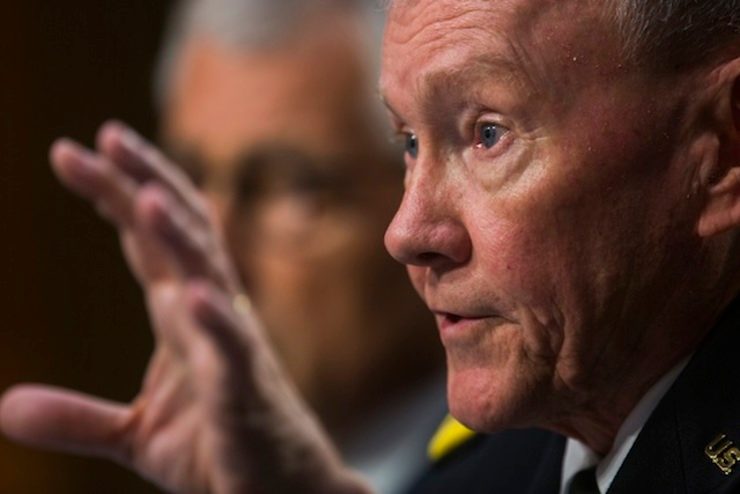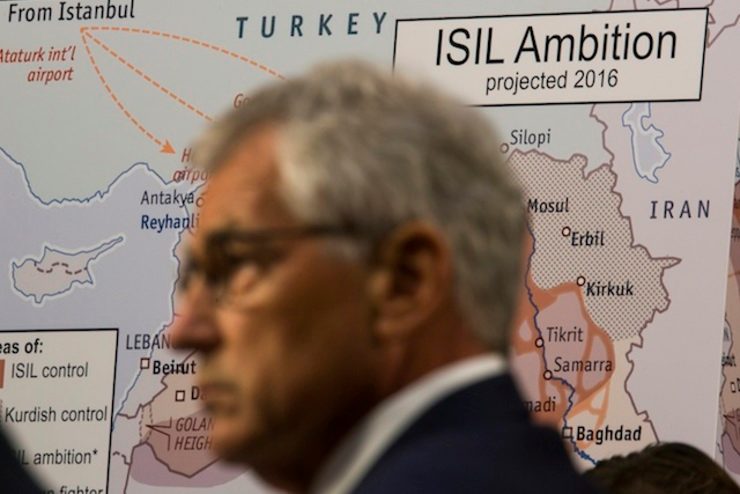SUMMARY
This is AI generated summarization, which may have errors. For context, always refer to the full article.

WASHINGTON DC, USA – The United States plans to strike the Islamic State (ISIS) group in its Syrian strongholds and could yet send military advisors into combat alongside Iraqi troops, American commanders said Tuesday, September 16.
The White House scrambled to play down talk of US ground troops joining the battle after top US officer General Martin Dempsey said they could “provide close-combat advising” to Iraqi forces.
As chairman of the joint chiefs of staff, Dempsey is President Barack Obama’s chief military advisor, but the White House insisted the idea of US troops in battle was a “purely hypothetical scenario.”
Military leaders warned of a further escalation in their battle against the jihadists just as two branches of the rival Al-Qaeda group called for a united front against the war coalition Washington is building.
US jets have been targeting ISIS jihadists in northern Iraq since August 8, and on Monday and Tuesday hit militants southwest of Baghdad for the first time, in a significant expansion of the campaign.
US Central Command said that, in addition to bombing ISIS fighters threatening the northern city of Arbil, strikes had destroyed a guerrilla ground unit and two supply boats southwest of Baghdad.
The campaign bore fruit on Tuesday when Kurdish peshmerga fighters – who now receive Western military supplies and US air support – retook 7 Christian villages overrun by jihadists.
In Washington, Defense Secretary Chuck Hagel told US lawmakers that plans are being laid to hit targets in Syria, where the IS group is holding Western hostages and has a stronghold in the city of Raqa.
“This plan includes targeted actions against ISIL safe havens in Syria, including its command and control, logistics capabilities, and infrastructure,” Hagel told the Senate Armed Services Committee, using an alternate name for the group.
‘Close-combat advising’
Meanwhile, Dempsey went further than any US official had gone before in admitting that the military advisors that Obama has dispatched to bolster Iraqi forces could get drawn into combat.
Obama’s administration has insisted that his action against the ISIS extremists is not the start of another US ground war in the Middle East, and that there will be no large-scale American invasion.

But nearly 300 US military advisors are already working with Iraqi government forces, 300 more are on their way and Dempsey refused to rule out them providing “close-combat advising.”
Canada has sent 69 of its soldiers to advise Iraqi forces, Prime Minister Stephen Harper said, and other allies may follow suit.
“To be clear, if we reach the point where I believe our advisors should accompany Iraqi troops on attacks against specific ISIL targets, I will recommend that to the president,” Dempsey said.
Dempsey stressed the advisors are “very much in a combat-advisory role” and that there is “no intention” at the moment for them to engage in combat: “I don’t see it to be necessary right now.”
But he said if there were an “extraordinarily complex” operation planned by Iraqi forces – such as a bid to recapture the rebel-held city of Mosul – then advisors could head to the front.
Dempsey said any use of US troops in the field would be approved by Obama, explaining: “He told me to come back to him on a case-by-case basis.”
White House spokesman Josh Earnest was keen to underscore this, after Dempsey’s remarks caused a flurry of speculation that US forces would once again suffer “mission creep” in the Middle East.
Earnest said Dempsey “was referring to a hypothetical scenario in which there might be a future situation in which he might make a tactical recommendation to the president as it relates to the use of ground troops.”
“The president has been clear about what that policy is: the president does not believe that it would be in the best interest of our national security to deploy American ground troops in a combat role in Iraq and Syria. That policy has not changed.”
Obama has vowed to expand American efforts and US diplomats are scrambling to put together an international coalition for a “relentless” campaign against the jihadists.
On Tuesday he met General John Allen, the former Marines commander tasked with coordinating the US-led coalition’s mission to “degrade and ultimately destroy” the Islamic State group.
The slow coming together of this alliance drew a fierce reaction from Al-Qaeda’s branches in Yemen and in North Africa, who said jihadist forces must unite against the threat posed by the coalition.
The Islamic State group began as a successor to Al-Qaeda’s Iraqi branch, but has escaped from the group’s shadow and clashed with its surrogates in Syria, while claiming leadership of global jihad.
Murdered on camera
The two days of US strikes against ISIS fighters in the Sadr al-Yusufiyah area, 25 kilometers (15 miles) from Baghdad, were the first in support of Iraqi forces near the capital.
They bring the number of US air strikes across Iraq to 162. The CIA estimates that the Islamic State organization may be able to field as many as 31,500 fighters – many of them foreign volunteers.
Sadr al-Yusufiyah lies in the Euphrates Valley between the militant stronghold of Fallujah and the key battleground of Jurf al-Sakhr. It is one of the closest front lines to Baghdad.
Western nations and 10 Arab countries, including regional powerhouses Saudi Arabia and Egypt, have agreed to back the US-led coalition campaign, but not all will engage in military action.
Over the weekend, Islamic State militants further upped the stakes in their battle with the West, murdering a British aid worker – the third Western hostage to be executed on camera. – Rappler.com
Add a comment
How does this make you feel?
There are no comments yet. Add your comment to start the conversation.